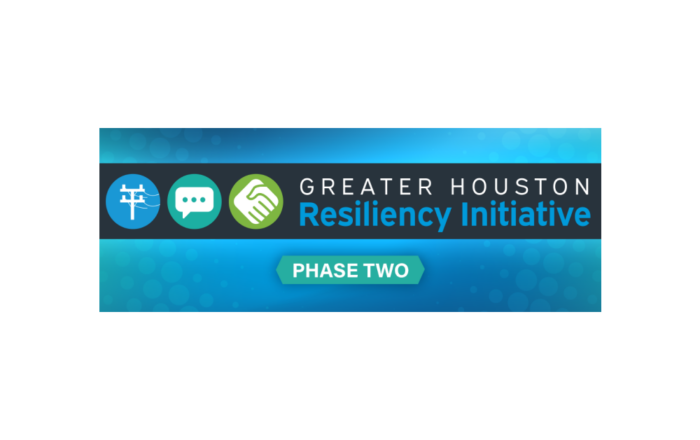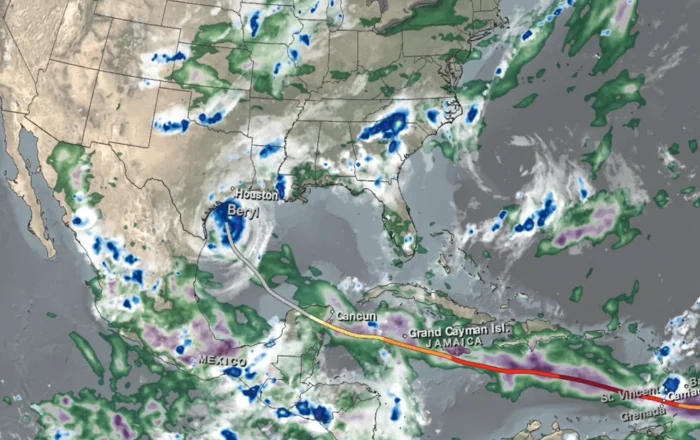It’s essential to recognize the distinctions between the 5 categories of hurricanes. With a full of understanding of the hurricane scale and the damage each type of hurricane may cause, Texans can make informed decisions, ensuring the safety of their homes and loved ones.
Hurricane categories 1-5 explained
Hurricanes are sorted into 5 categories based on their sustained wind speed. The higher the speed, the higher category, and the more dangerous and destructive the storm. These categories come from the Safir-Simpson Hurricane Scale.
- Category 1 Hurricane: 74 to 95 mile per hour winds.
- Category 2 Hurricane: 96 to 110 mile per hour winds
- Category 3 Hurricane: 111 to 129 mile per hour winds
- Category 4 Hurricane: 130 to 156 mile per hour winds
- Category 5 Hurricane: Over 157 mile per hour winds
Category 1 Hurricanes
Category 1 hurricanes create the least amount of damage. They can cause minimal damage to building structures like roof shingles, vinyl siding, and gutters. The wind is strong enough to break tree branches and uproot young trees with shallow roots. Damage to power infrastructure can cause outages for several days.
Category 2 Hurricanes
Category 2 wind speeds can cause significant damage to homes and buildings. Roofs, doors, and windows can require complete replacement. Winds will pick up loose objects outdoors and turn them into dangerous projectiles. Power outages can last several days or even longer.
Category 3 Hurricanes
Damage from category 3 hurricanes can be extensive. Structural damage to buildings may include wall failure. Mobile homes can be destroyed entirely. Larger trees can be uprooted or snapped. Power outages can last weeks after a hurricane of this strength.
Category 4 Hurricanes
After a category 4 hurricane, damage is expected to be devastating from the incredibly high wind speeds. More wall failures and roof collapses are expected. Regions hit by the most severe weather can expect power outages for weeks.
Category 5 Hurricanes
Category 5 hurricanes are the most catastrophic. Smaller buildings may be blown away entirely, with most homes and buildings experiencing complete wall and roof failure. Power outages may last for months after a storm this size.
Hurricane watch vs warning: what’s the difference?
Hurricane watches and hurricane warnings have slightly different meanings. A hurricane watch indicates that a hurricane is possible, while a hurricane warning indicates that a hurricane is expected. A warning is more severe than a watch.
- Hurricane watch: When a hurricane watch is issued, it means that hurricane conditions, such as high winds and heavy rainfall, are possible within the next 48 hours. It’s a heads-up to start preparing and monitoring the storm’s progress.
- Hurricane warning: Warnings are more immediate and indicate that hurricane conditions are expected in the area within the next 36 hours. At this point, it’s crucial to finalize preparations, follow local officials, and be ready to take action.
Hurricane stages explained
There are several stages a storm goes through before officially being recognized as a hurricane that can be classified as a category 1 through 5 storm.
- Disturbance formation
- Tropical formation
- Tropical disturbance
- Tropical depression
- Tropical storm
- Hurricane
- Dissipation
Learn more about the stages of hurricane development.
Affordable electricity with BKV Energy
A solid understanding of the categorization of hurricanes underscores the need to be prepared for the upcoming hurricane season, as well as choosing an electricity provider that is ready to support its customers when the time comes.
Choosing BKV Energy ensures that your electricity provider will not only help you save money, but will be ready to keep you updated and supported during a potential disaster. Enter your zip code to explore plans in your area and discover the rewards and benefits with our Bluebonnet plan.
Graham Lumley, Digital Marketing Manager at BKV Energy, leads digital and traditional marketing strategies, focusing on educating Texans about the state's deregulated energy market. With over 8 years of marketing experience, he creates content to help consumers understand and save on their energy bills, bringing a fresh and dynamic approach to the industry.
Related articles
Hurricanes
Is CenterPoint Prepared for the 2025 Hurricane Season?
2 minute readAs the 2025 Atlantic hurricane season approaches, many Houstonians may wonder whether they will suffer through more extended power outages like those experienced after Hurricane Beryl in 2024. CenterPoint recently released a report on its progress in bolstering the resilience of the Houston area power grid. Here’s everything you need…
Hurricanes
Atlantic Hurricane Season 2025 Outlook
3 minute readScientists predict an “above normal” 2025 hurricane season On April 3, the Colorado State University Tropical Weather & Climate Research team released its forecast for the 2025 Atlantic hurricane season. They are expecting this season to bring “above normal” activity. This year’s hurricane season prediction is lighter than last year’s.…



